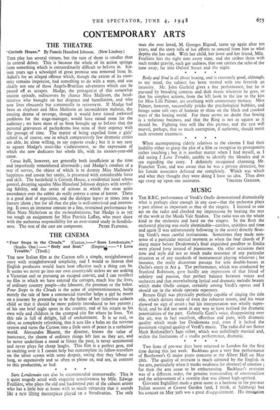CONTEMPORARY ARTS
THE THEATRE
"Corinth House." By Pamela Hansford Johnson. (New Lindsey.) THIS play has several virtues, but the sum of them is smaller than its central defect. This is because the whole of its action springs from something which is extraordinarily difficult to believe in. Six- teen years ago a schoolgirl of great promise was removed from St. Aidan's for an alleged offence which, though the extent of its enor- mity remains imprecise, had something to do with a man, and was clearly not one of those Angela-Brazilian adventures which can be passed off as scrapes. Madge, the protagonist of this somewhat ancient episode, rediscovers by chance Miss Malleson, the head- mistress who brought on her disgrace and humiliation, and who now lives obscurely but contentedly in retirement. If Madge had been an elephant and Miss Malleson an inconsiderate mahout, the ensuing drama of revenge, though it would have raised awkward problems for the stage-manager, would have raised none for the audience ; we have most of us been brought up to believe that the personal grievances of pachyderms lose none of their cogency with the passage of time. The matter of being expelled from a girls' school is, of course, one in which comparatively few dramatic critics are able, let alone willing, to say experto crede ; but it is not easy to square Madge's stoat-like vindictiveness, to the expression of which she now dedicates her whole life, with its sixteen-year-old cause.
Casus belli, however, are generally both insufficient at the time and imperfectly remembered afterwards ; and Madge's conduct of a war of nerves, the object of which is to destroy Miss Malleson's happiness and unseat her sanity, is presented with considerable force and skill. The battlefield is Corinth House, a residential hotel whose genteel, decaying squalor Miss Hansford Johnson depicts with terrify- ing fidelity, and the series of actions in which the stoat gains ascendancy over the rabbit do really convey a sense of horror. There is a good deal of repetition, and the dialogue lapses at times into a literary idiom ; but for all that the play is well-contrived and interest- ing. It owes an immense amount to a fine, restrained performance by Miss Nora Nicholson as the ex-headmistress, but Madge is as yet too tough an assignment for Miss Patricia Laffan, who must share with the authoress responsibility for an over-stated study in fiendish-


































 Previous page
Previous page